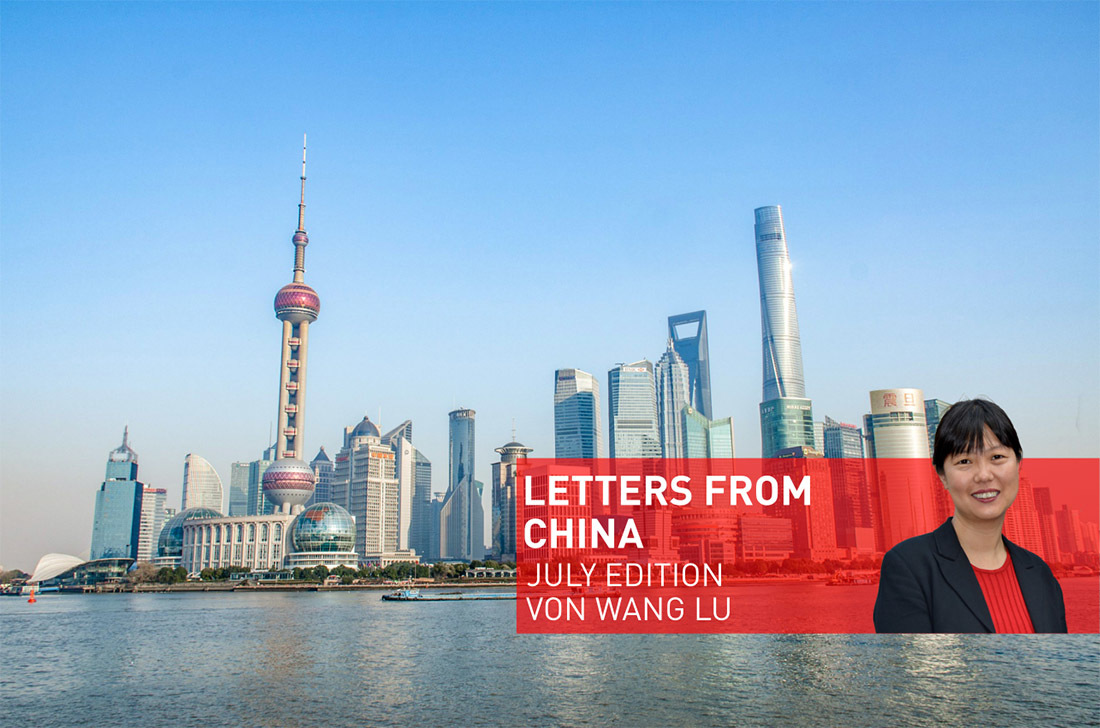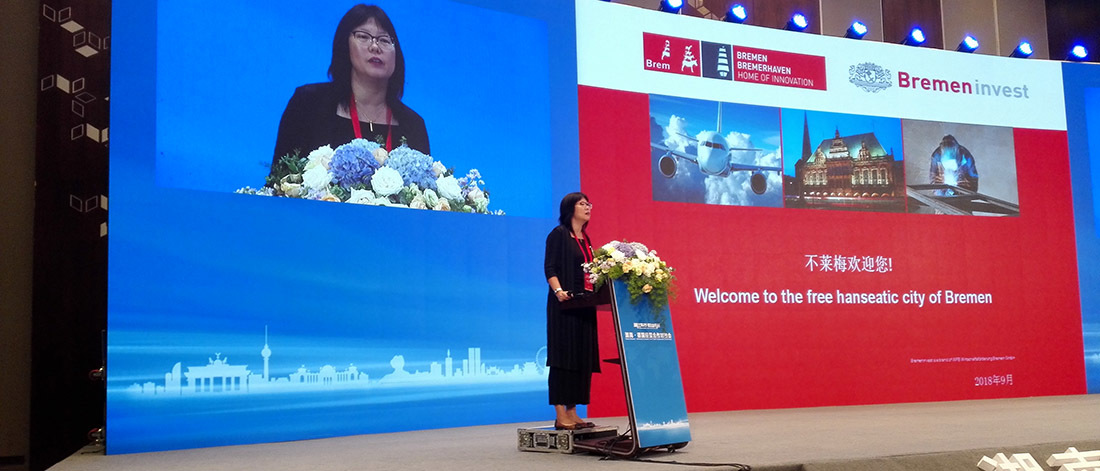Letters from China: July 2019 edition
Letters from ...
The trade dispute between the US and China is dominating the headlines – but there are plenty of other newsworthy things happening throughout this vast Asian country. More than enough for us to produce our Bremeninvest country newsletter China every four months.
Every year, Bremen companies export goods to the value of one and a half billion euros to China, making it the city’s third-largest trading partner. The country is also an important source market for imports to Bremen. Every four months, Lu Wang, director of the local Bremeninvest office, reports from Shanghai on trends, opportunities and developments in China.
Our topics in July:
Building bridges with artificial intelligence (AI)

China is on its way to becoming the leader in AI – or at least that is its ambition by 2030. Two years ago, the country adopted a high-profile AI strategy, and it has been pouring billions of state and private investment into research and development ever since. The goal is for the AI market to produce revenues of over 150 billion US dollars in less than ten years’ time.
A good reason to take a closer look at the rapid development of AI in the country. In April 2019, Professor Frank Kirchner, head of the Robotics Innovation Center at the German Research Center for Artificial Intelligence in Bremen, visited China as part of a delegation. He was fascinated by the local approach to the new technology: “China has made up a lot of ground, and is now playing in the top league as far as AI development is concerned. We are all researching the same topics worldwide. Chinese society also takes a much more progressive approach to the use of artificial intelligence – much like the US. While German media often report on regulations and restrictions, in China they tend to focus more on the opportunities and the vast array of new possibilities.”
He sees great opportunities for companies and research institutes from Bremen to benefit from Chinese AI technology. “Many German and European companies already prefer to do their research and development in China. There are fewer restrictions there, processes are faster, and above all, they have a large pool of fully-trained AI experts coming straight from the universities.” In China, it is easier to obtain permission to set up a test track for driverless cars, for example, and there is also a greater availability of data to train AI systems. Kirchner continues: “This also offers opportunities for small and medium-sized companies from Germany. The Chinese provinces are in competition with each other, which means they provide attractive investment opportunities, creating an economic incentive to carry out development activities locally.”
Communication in China: What exactly is WeChat?

An urban Chinese person without a smartphone – hard to imagine. 60 per cent of the country’s population are online, 98 per cent of them via a smartphone, and pretty much everyone is using WeChat. The app is the most commonly used method of communication. It goes far beyond what its Western counterparts such as WhatsApp do. In addition to chatting, the app also offers a social network where companies, celebrities and news pages have a presence, similar to Facebook here. At the same time, the app features a host of mini applications for booking tables in restaurants, contacting builders or making doctors’ appointments – or simply for gaming. And to top it all, WeChat Pay allows the Chinese to make virtually any sort of purchase, both online and offline. It has made cash pretty much obsolete in everyday life.
Anyone wanting to do business in China will need to get to grips with the app – a German version is available from the App Store. Given the rising numbers of Chinese tourists, the option of using WeChat Pay could be a way for German restaurants, hotels and retailers to make things easier for their customers, and thereby increase their revenue. Last year, Bremen welcomed around 8,000 visitors from the Far East.
It’s not absolutely necessary to use the app’s payment function directly, and it would be difficult to do for foreigners without a Chinese bank account. A number of payment service providers, such as Wirecard, are already offering systems that are compatible with WeChat Pay (or its competitor app, Alipay).
Read more: www.mobilegeeks.de/artikel/wechat/ and www.businessofapps.com/data/wechat-statistics/
Link tip: China Techcity
The Abacus News website presents China’s major tech companies from the consumer goods, internet and social media sectors within one impressive animation: https://www.abacusnews.com/china-tech-city
5G
5G launched in China

The German Federal Government weren’t the only ones issuing 5G licenses in June. China was also handing out transmission frequencies for the new mobile communications standard to four state-owned operators. Unlike the German licenses, this involved no bidding process. The network operators are planning to establish the new technology quickly, with the first networks being operational in the largest cities by the end of 2019. In Germany, 5G is only scheduled to start in 2020, and experts are expecting an initially slow rollout, concentrated within the major conurbations.
This decision also benefits the technology group Huawei, the telecommunications provider that is supplying the bulk of the technical equipment required for the transmitters – perhaps allowing it to offset the severe impact on its business model caused by the US technology embargo during the trade dispute. This depends on the company being able to find a replacement for the technology previously supplied by the US.
Why not sign up to Bremeninvest’s country newsletters now? You will receive three newsletters a year with the latest news, background information and expertise on innovative locations in Bremeninvest’s four key markets.
5G is the next generation of mobile communications, delivering speeds that are up to ten times faster. In addition to providing faster internet access for consumers, the technology is of particular significance for the Internet of Things, i.e. devices, machines or cars that are linked to the internet. It is an important requirement for the next phase of the digital transformation, such as autonomous vehicles.
Establishing a presence in China: The ‘office-in-office’ solution

Around 200 companies from Bremen have a presence in China – which takes all sorts of different forms, ranging from having their own offices or production sites to making do with just a handful of employees. The simplest solution is what’s known as ‘office-in-office’. This is when a company makes use of the existing office infrastructures of another firm or institution, in effect subletting them. This saves a lot of start-up costs. Bremeninvest, the brand under which Bremen is being promoted to foreign investors and relocating companies, also makes use of this option. Lu Wang’s office is within the Shanghai office of Bremen retail group Melchers, one of the oldest and most experienced German companies when it comes to doing business in China. Find out here what you need to know before setting up a location in China.
A Chinese woman in Bremen: App CN

Jiani Chen recently moved to Bremen. The energetic young Chinese woman founded the start-up App CN in the Hanseatic city and is now looking to kick-start her international business. In our story The magic of bicycles, flower stalls and book shops she talks about differences between Germany and her home country, Bremen peculiarities and new discoveries.
Lu Wang
Bremeninvest China / Office Shanghai
Director Bremeninvest China
+86 21 5081 5576
Success Stories
Letters from Türkiye: Summer 2025 edition
Türkiye is focusing on high-tech innovation in order to achieve long-term growth. Will it succeed? Our Türkiye expert Erol Tüfekҫi explains in our country report.
Learn moreLetters from Vietnam: Winter 2025 edition
What effects will the sweeping changes in the White House have on Vietnam's economy? Could the current administrative reforms have negative implications for foreign investors? These topics and more will be discussed in the latest Letter from Vietnam.
Learn moreLetters from Vietnam: Summer 2024 – Are German companies underestimating Vietnam?
Are German companies underestimating investment opportunities in Vietnam? And is Cambodia stealing the limelight from Vietnam? You'll find details about all this and more in our summer 2024 Vietnam newsletter.
Learn more

